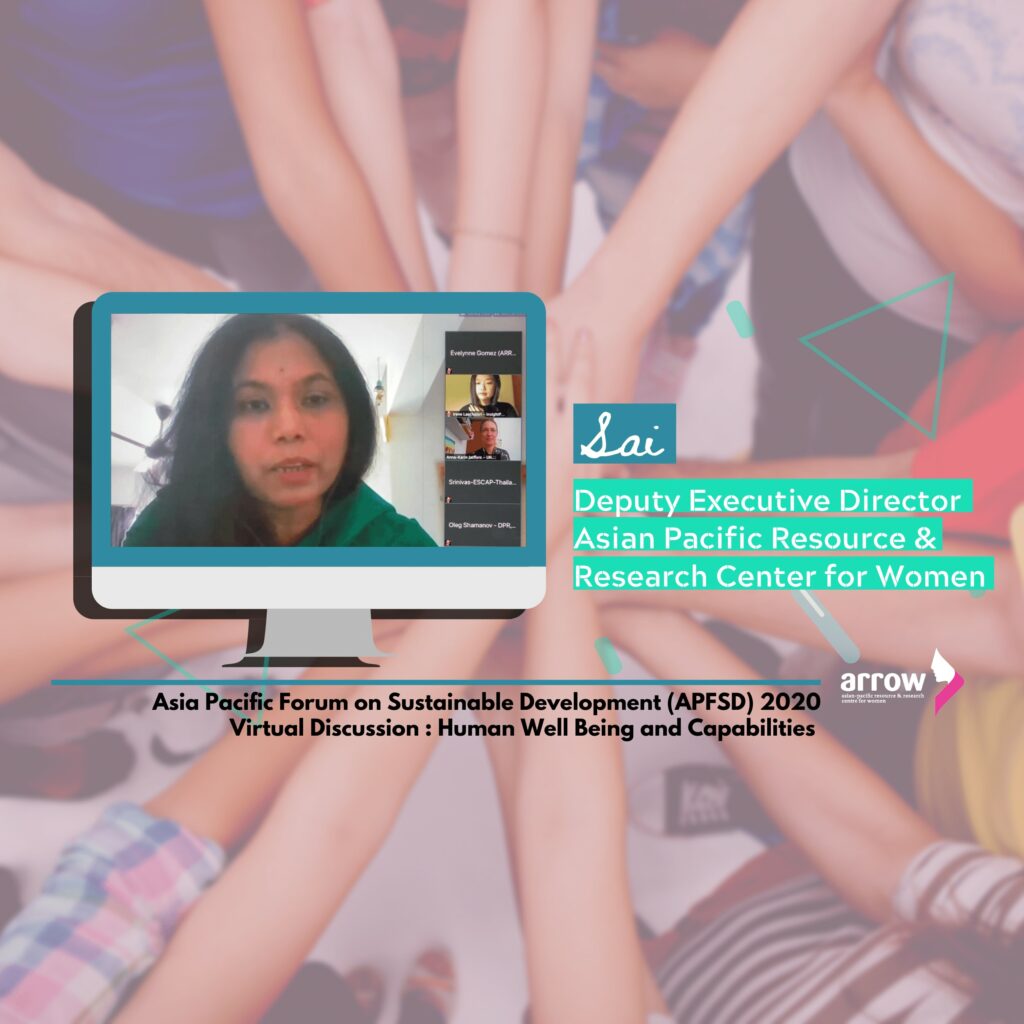This statement was presented by Arrow’s Deputy Executive Director Sai Racherla at the APFSD Virtual Consultation on 1 April 2020. To watch the full intervention, click HERE.
Good morning everyone.
I am Sai, from the Asian Pacific Resource and Research Centre for Women (ARROW), and am presenting the APRCEM Civil society perspective drawn from the survey results and collective CSO inputs to the factsheet focused on Human Well Being and Capabilities entry point.
We are presenting this CSO statement, at a time when the region and the whole world is dealing with the devastating COVID19 pandemic. This has significant implications for human well- being, capabilities, public health, economic security, and social stability. Despite actions by the governments, it is disturbing to note the lockdown measures for instance in my country India has left millions, especially migrant workers impoverished, jobless, hungry and helpless. The quarantines, emergency settings, movement restrictions, and other circumstances may pose serious risk of increased incidents of gender-based violence (GBV), exacerbating gender inequality and human rights violations.
Situation in the region and recommendations in regards to the specific entry point
Based on the CSO monitoring, an assessment of the trends in the region on human wellbeing and capabilities entry point, points to uneven progress and even negative trends. At the outset, we would like to emphasise, that reviewing the SDGs from the entry point clusters needs to be looked at critically given the intricate inter-linkages of the goals across entry points.
The region is experiencing a huge spike in inequalities around income, wealth, access to quality education, water and sanitation, health including sexual and reproductive health, and other social services. The increasing privatisation and marketisation of education, health, and other social services across the region exacerbate social inequity as they discriminate against the poor, widen gender disparities, undermine the public systems.
While progress has been made towards ending poverty, a significant number of world’s extreme poor are still living in South Asia, which means the progress we are making is insufficient. Current global and national economic models are rigged against women and marginalised groups. Further to this over 60 percent of the Asia-Pacific people lack access to social protection.[1] Governments need to ensure universal access to social security, with countries developing national social protection systems, that comprise basic, lifelong social security guarantees for all people, including health care and income security.
While education is touted to make progress, gender disparities in education continue to persist within countries and across countries as well as by economic status, ethnicity, location, background or physical and mental abilities. Estimates point to at least 18.7 million children out of school in the region.[2]
Today, negative trends are seen below 2000 levels, with the water and sanitation goal. Around 1.6 billion people in the region lack access to basic sanitation, and an estimated 260 million also lack access to clean water at home[3]. This is a basic need. Tracking the goal on health and well-being (Goal 3), shows uneven progress in regards to maternal mortality reduction, neonatal and child mortality across countries and within countries. Many more in the region are lacking access to affordable health care. Estimates indicate that over 4 in 10. people in the region have no access to health care posing great danger to achievement of universal health care coverage.
Governments need to ensure universal access to health coverage (UHC) where all people and communities can use the promotive, preventive, curative, rehabilitative and palliative health services they need, of sufficient quality, while also ensuring that the use of these services does not expose the user to financial hardship. These services should be available to all people including young persons and services should include, SRH services, contraception, safe delivery and abortions services without stigma discrimination and upholding privacy and confidentiality
It is a disgrace that progress on gender equality has been far too slow in the region. Governments need to ensure the full realization of women’s human rights, by revoking all gender discriminatory legislation, policies and practices that contribute to gender inequalities. End harmful practices, including child, early and forced marriage, female genital mutilation and honour killings an end impunity for gender-based violence in all its forms
Governments need to ensure clear financing strategies, and financial resources needed to achieve the SDG targets on human wellbeing and capabilities are in place, as well as ensure transparency and participation, to allow for public scrutiny of policies, financing and budgeting .
In particular, we note with concern the shrinking space for civil society engagement at national, regional, and global levels.
Finally ensure availability of reliable data to effectively measure progress towards the SDGs, is crucial. The data monitoring systems need to be made rigorous with triangulation of national data with CSOs and independent technical experts at the national level. Promote the availability of gender and age disaggregated data among other disaggregations.
The crux of the recommendation is to call for universal access to human wellbeing and capabilities through sound governance measures and multi stakeholder collaboration. The achievement of the SDGs is squarely dependent on addressing the structural and systemic barriers like patriarchy, caste system, communalism, institutionalised racism, class, that perpetuate inequalities, discrimination, exploitation and oppression. The intersectionality’s of these barriers further creates more discrimination and inequalities.
Finally, I would like you all to pause for a moment and visualise what intersectional discrimination a rural, poor, less educated, dalit handicapped woman would face in her community. (pause) . When this visualisation of lived reality is positive that’s when we know we are making progress!
Thank you.
[i] What it takes: Addressing Poverty and Achieving Food Sovereignty, Food Security and Universal Access to Sexual and Reproductive Health Services. ARROW 2014
[ii] Multidimensional Poverty Index (MPI) http://hdr.undp.org/en/content/multidimensional-poverty-index-mpi
[iii] Eradicating poverty in Asia Pacific. http://sdgasiapacific.net/download/AP_SDG_Thematic-Report_2017.pdf
[1]https://www.unescap.org/sites/default/files/COVID%20_Report_ESCAP.pdf
[2] UNESCO-Bangkok’s 2019 analysis of SDG 4
[3]https://www.unescap.org/sites/default/files/COVID%20_Report_ESCAP.pdf


